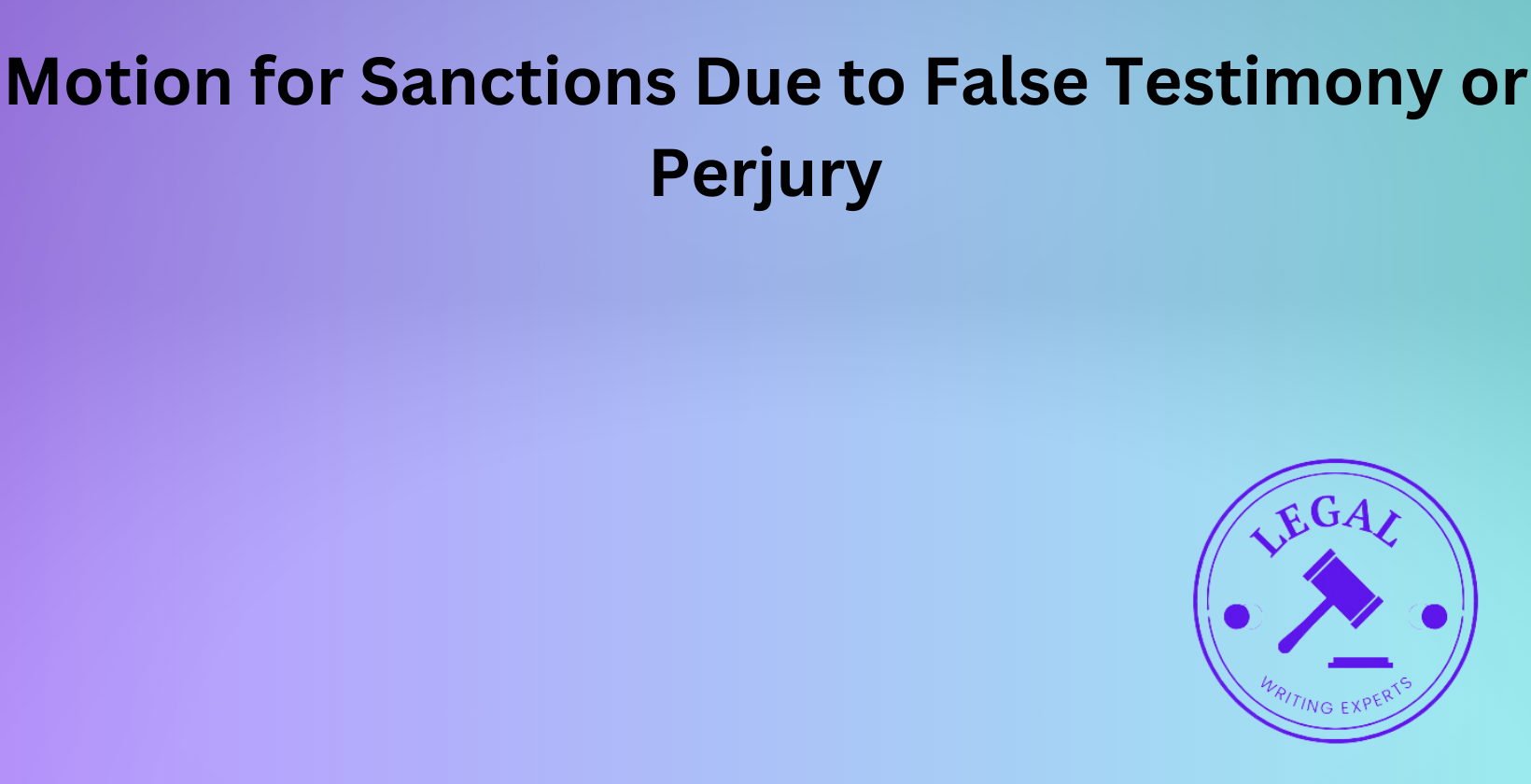Motion for Sanctions Due to False Testimony or Perjury
Written by
Jessica E
February 10, 2025 · 8 min read

A motion for sanctions due to false testimony or perjury is a formal legal request asking the court to impose penalties on a party that has provided false statements under oath. Perjury is a serious offense that can undermine judicial proceedings and obstruct justice. Courts impose sanctions to maintain the integrity of the legal system and ensure that all parties provide truthful information. This article outlines how to draft, file, and support a motion for sanctions based on false testimony, including legal grounds, evidence requirements, potential consequences, and defenses against perjury allegations.
What Is a Motion for Sanctions Due to False Testimony or Perjury?
A motion for sanctions due to false testimony or perjury is a legal document that requests the court to penalize a party for lying under oath. The penalties can range from monetary fines to case dismissal or criminal charges. Providing false testimony disrupts judicial fairness, and courts use sanctions to deter such conduct and uphold the legal process.
How to Write a Motion for Sanctions Due to False Testimony or Perjury?
Writing a motion for sanctions due to false testimony or perjury requires drafting a well-structured legal document. The motion must include a clear statement of facts, the legal basis for sanctions, supporting evidence, and a request for specific relief. Legal document drafting services can assist in preparing a motion that aligns with court rules and procedural requirements. Engaging a legal document writer ensures accuracy and effectiveness in presenting the claim.
Where to Hire a Legal Writer to Draft a Motion for Sanctions Due to False Testimony or Perjury?
Legal writers specializing in motion drafting can be hired through legal research companies, freelance legal research platforms, or legal writing services such as Legal writing Experts. Many professionals offer online legal document drafting services that cater to court filings. Choosing a legal document drafting service ensures the motion is professionally written, properly formatted, and compliant with jurisdictional requirements.
How to File a Motion for Sanctions Due to False Testimony or Perjury?
Filing a motion for sanctions requires submitting the document to the appropriate court and serving a copy to the opposing party. The motion must comply with court rules regarding formatting, deadlines, and procedural requirements. Many jurisdictions allow electronic filing, while others require physical submission. Legal document review services near me can verify compliance before filing, ensuring the motion adheres to court standards.
What Are the Legal Grounds for Filing a Motion for Sanctions in Cases of Perjury?
The legal grounds for filing a motion for sanctions in cases of perjury include intentional false statements made under oath, obstruction of justice, and fraud upon the court. Courts require proof that the false testimony was willful and material to the case. Legal drafting services can help ensure the motion cites relevant statutes and case law to strengthen the argument.
What Evidence Is Required to Support a Motion for Sanctions Due to False Testimony?
Evidence required to support a motion for sanctions due to false testimony includes sworn affidavits, transcripts, video recordings, and contradictory evidence proving the false statement. Courts assess whether the evidence establishes intentional deception. Legal research services can help gather and analyze supporting documents to substantiate the claim.
What Are the Potential Consequences for Providing False Testimony in Court?
The potential consequences for providing false testimony in court include monetary fines, case dismissal, reversal of a favorable ruling, and criminal prosecution for perjury. Courts impose these penalties to maintain judicial integrity and prevent misconduct. According to a study by the American Bar Association, courts frequently impose fines and legal sanctions as deterrents against false testimony.
How Do Courts Determine Intent in Cases of Alleged Perjury?
Courts determine intent in cases of alleged perjury by examining inconsistencies in testimony, corroborating evidence, and the context of the false statements. Judges assess whether the testimony was knowingly false or a result of misunderstanding. Legal research freelance professionals can analyze past rulings to understand how courts interpret intent in similar cases.
What Are the Possible Sanctions Imposed for Perjury in Legal Proceedings?
The possible sanctions imposed for perjury in legal proceedings include monetary fines, evidentiary restrictions, adverse inference rulings, and criminal charges. Judges have discretion in determining appropriate penalties based on the severity of the false testimony. Legal document review online services can evaluate court precedents to predict potential sanctions in a given case.
Can a Case Be Dismissed Due to False Testimony or Perjury?
Yes, a case can be dismissed due to false testimony or perjury when the false statements significantly impact the proceedings. Courts may dismiss claims or defenses if they were built on fraudulent testimony. However, dismissal is typically reserved for severe cases where perjury undermines the integrity of the litigation.
What Are the Defenses Against Allegations of Perjury in Court?
The defenses against allegations of perjury in court include lack of intent, mistaken belief, insufficient evidence, and coercion. Defendants may argue that discrepancies in testimony were due to memory lapses or misunderstanding rather than deliberate deception. Legal research service professionals can help build a strong defense by analyzing case law and providing supporting evidence.
How Does Perjury Impact the Outcome of Legal Cases?
Perjury impacts the outcome of legal cases by affecting credibility, influencing judicial decisions, and potentially leading to case dismissal or sanctions. Courts consider false testimony when evaluating the reliability of witnesses and making rulings. Legal document drafting services can assist in preparing motions that highlight the effects of perjury on a case’s outcome.
By following proper legal procedures and gathering strong evidence, parties can effectively file and argue motions for sanctions due to false testimony or perjury. Hiring a legal writer or engaging legal research companies ensures the motion meets court standards and enhances the likelihood of a favorable outcome.


